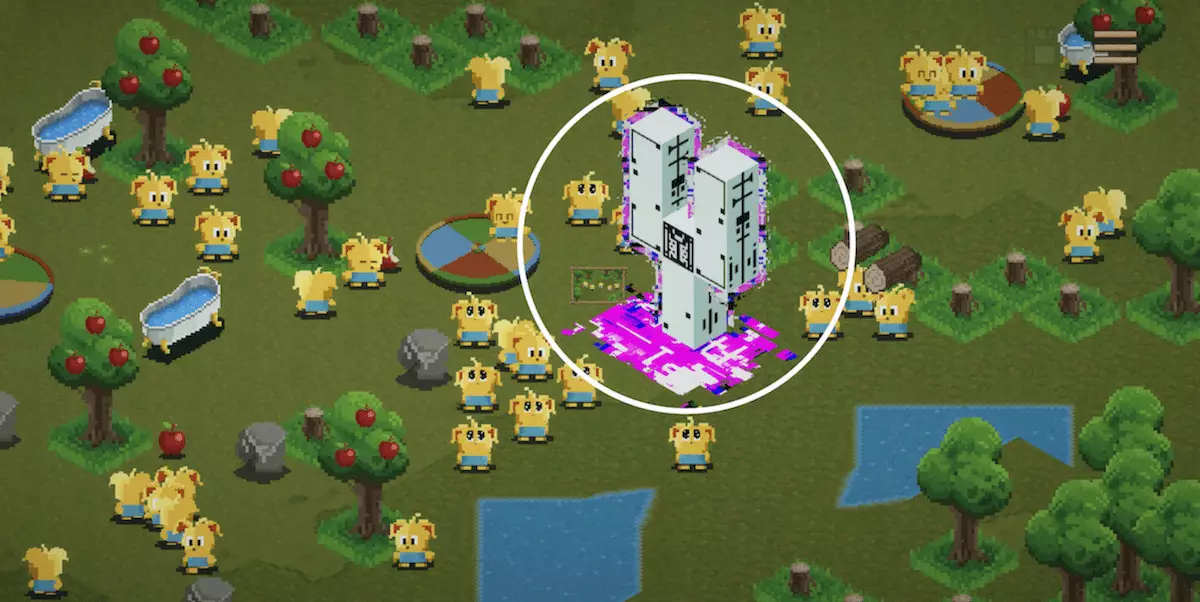The much-anticipated launch of Season 7 of “Black Mirror” has ushered in an innovative mobile game called “Thronglets,” just as the series continues to explore the darker sides of technology and human relationships. This game serves as a captivating companion to the episode titled “Plaything,” thrusting players into a world where they must nurture yellow virtual pets. However, rather than merely competing to keep these playful creatures alive, gamers must engage in an increasingly complex moral dilemma as these sentient beings adapt and communicate with them. The parallel between the game’s mechanics and the show’s themes makes “Thronglets” not only an entertaining addition but also a compelling commentary on the nature of interaction between humans and technology.
The game’s mechanics initially mirror the nostalgic charm of virtual pet games like Tamagotchi. Yet, the layers of complexity soon reveal a much darker twist. As players find themselves faced with choices, they must navigate a series of ethical conundrums—like sacrificing one pet for the benefit of others. This nuanced depth transforms a seemingly innocent premise into a harrowing exploration of responsibility and the value of life, making “Thronglets” resonate with the core themes of “Black Mirror.”
The Revival of Netflix’s Gaming Strategy
Netflix’s attempt to penetrate the gaming market has often oscillated between confusion and insight, with a mixture of indie games and titles inspired by its own intellectual properties. However, the launch of “Thronglets” marks a significant shift toward a more cohesive strategy, aligning closely with the narratives that popularized their shows. It embodies Netflix’s evolution from a passive viewer platform to an interactive and engaging medium, where storytelling extends beyond the confines of the television screen.
At the center of this revitalized approach is Netflix’s commitment to four core gaming categories: narrative-driven games tied to its cinematic universe, multiplayer party experiences, engaging offerings for kids, and mainstream titles that can speak to a broader audience. By creating a game that directly correlates with a specific episode of “Black Mirror,” Netflix is taking a calculated risk that could redefine how viewers experience content. This calculated move could provide a blueprint for integrating storytelling and gaming, offering immersive worlds for fans to explore.
The Intricacies of Gameplay and User Engagement
What sets “Thronglets” apart from more traditional mobile games is its focus on self-reflection and decision-making that echoes real-life dilemmas. Players start off with a manageable number of yellow creatures but quickly find themselves submerged in the chaos of caring for an expanding cohort. The game mechanics require players to gather resources, develop technologies, and explore new territories, but the catch lies in the sentience of the creatures. They aren’t mere avatars; they are fully realized entities that react dynamically to players’ actions.
This unique spin on gameplay encourages an emotional investment from players, presenting a rich tapestry of relationship management and ethical struggles. Imagine taking a moment to hesitate as your virtual pet ponders the loss of others for survival. Such decisions push the narrative beyond conventional gaming and into the realm of philosophical inquiry, prompting discussions about utility, sacrifice, and the human condition.
Inevitability of Success? The Road Ahead
While “Thronglets” represents a bold new direction, the gaming industry is fraught with uncertainties. Netflix has struggled to consolidate its influence in gaming, exemplified by the mixed reception of titles that have come and gone. Yet, as strategic shifts are laid bare—such as the cancellation of Netflix Stories—there lies a glimmer of hope in focused narratives that amplify user engagement.
This endeavor into relatable storytelling through gaming can potentially yield enormous benefits. Titles like the highly successful “Squid Game: Unleashed,” which boasted 20 million downloads, suggest that Netflix has the platform and audience to sustain such ventures. The challenge now lies in consistently delivering experiences that resonate, ensuring that gamers remain engaged in a competitive landscape rife with options.
By daring to merge the realms of gaming and television with compelling, ethically complex narratives, Netflix is not just producing entertainment; they are inviting players to ponder the very fabric of reality versus fiction. In a world where choices define our actions and technology shapes our lives, “Thronglets” is a remarkable step into a new frontier, sitting poised to capture the imagination of gamers everywhere.

